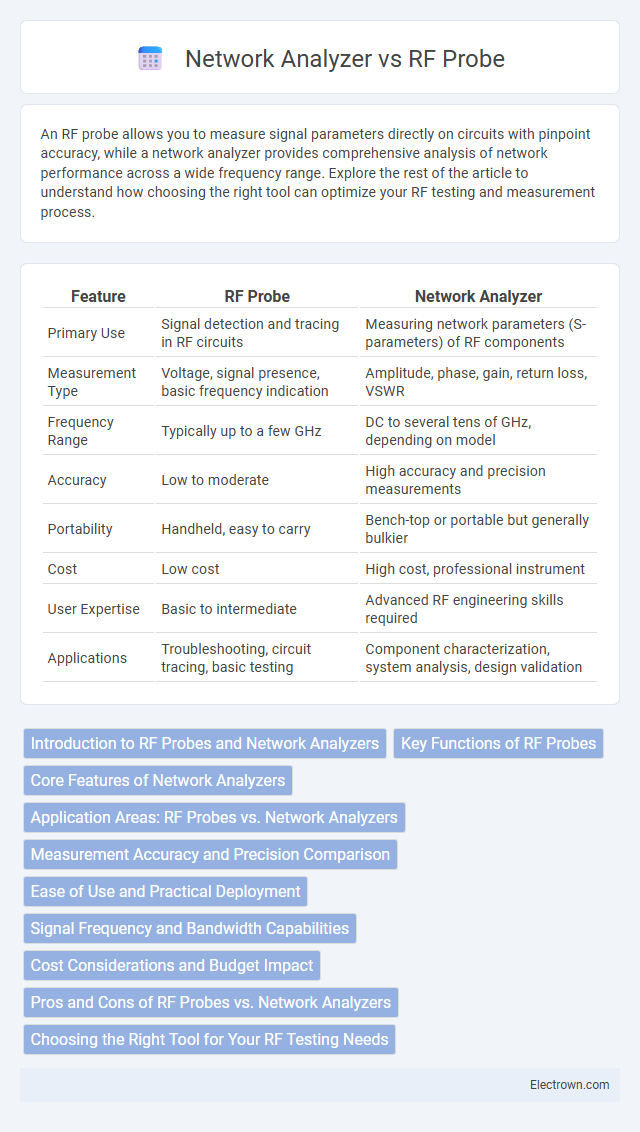An RF probe allows you to measure signal parameters directly on circuits with pinpoint accuracy, while a network analyzer provides comprehensive analysis of network performance across a wide frequency range. Explore the rest of the article to understand how choosing the right tool can optimize your RF testing and measurement process.
Table of Comparison
| Feature | RF Probe | Network Analyzer |
|---|---|---|
| Primary Use | Signal detection and tracing in RF circuits | Measuring network parameters (S-parameters) of RF components |
| Measurement Type | Voltage, signal presence, basic frequency indication | Amplitude, phase, gain, return loss, VSWR |
| Frequency Range | Typically up to a few GHz | DC to several tens of GHz, depending on model |
| Accuracy | Low to moderate | High accuracy and precision measurements |
| Portability | Handheld, easy to carry | Bench-top or portable but generally bulkier |
| Cost | Low cost | High cost, professional instrument |
| User Expertise | Basic to intermediate | Advanced RF engineering skills required |
| Applications | Troubleshooting, circuit tracing, basic testing | Component characterization, system analysis, design validation |
Introduction to RF Probes and Network Analyzers
RF Probes enable precise signal measurements by directly contacting circuit nodes, essential for troubleshooting and characterizing high-frequency circuits. Network Analyzers measure complex parameters such as S-parameters, providing detailed insight into a device's performance across a broad frequency range. Your choice between an RF Probe and a Network Analyzer depends on whether you need localized signal probing or comprehensive network characterization.
Key Functions of RF Probes
RF probes are essential tools designed for precise measurement and testing of high-frequency signals directly on circuits, offering localized access to radio frequency waveforms without disturbing the system. They provide key functions such as signal injection, voltage and current probing, and impedance measurements, which enable accurate characterization of components and transmission lines. Your testing efficiency improves significantly when using RF probes alongside network analyzers, as probes deliver detailed, point-specific data that network analyzers interpret to assess overall system performance.
Core Features of Network Analyzers
Network analyzers excel in measuring complex impedance, S-parameters, and phase relationships across a broad frequency range with high precision. They feature vector signal processing capabilities that allow detailed analysis of amplitude and phase characteristics critical for RF component evaluation. Advanced network analyzers also support calibration standards and automated testing routines to enhance measurement accuracy and repeatability compared to RF probes.
Application Areas: RF Probes vs. Network Analyzers
RF probes excel in pinpointing and measuring high-frequency signals on intricate PCB layouts, making them ideal for troubleshooting and device-level diagnostics. Network analyzers offer comprehensive assessment of RF components and systems, such as antennas, filters, and cables, by providing detailed S-parameter measurements across wide frequency ranges. You can select RF probes for detailed circuit-level testing, while network analyzers are best suited for system-level performance evaluation and calibration.
Measurement Accuracy and Precision Comparison
RF probes offer localized, high-resolution signal sampling that enhances measurement accuracy by minimizing signal distortion and loss. Network analyzers provide broad-spectrum analysis with precise calibration standards, delivering exceptional repeatability and precision across frequency ranges. Your choice depends on whether pinpoint accuracy at a specific node (RF probe) or comprehensive frequency response data (network analyzer) is essential for your testing needs.
Ease of Use and Practical Deployment
RF probes offer streamlined ease of use with simple handheld operation, enabling quick contact with test points and rapid signal acquisition, making them ideal for on-the-fly diagnostics and field measurements. Network analyzers provide comprehensive measurement capabilities but require more complex setup, calibration, and expertise, which can prolong deployment times in practical scenarios. For applications prioritizing fast, practical deployment, RF probes deliver efficient usability without sacrificing essential signal integrity verification.
Signal Frequency and Bandwidth Capabilities
RF probes typically operate within a limited frequency range, often up to a few gigahertz, making them suitable for testing specific components or circuits at lower signal frequencies. Network analyzers support a much broader frequency spectrum, ranging from kilohertz to several tens of gigahertz, enabling precise characterization of device performance across wide bandwidths. Their advanced bandwidth capabilities allow network analyzers to measure complex parameters like S-parameters and frequency responses with higher accuracy and resolution compared to RF probes.
Cost Considerations and Budget Impact
RF probes offer a cost-effective solution for direct testing and signal analysis, significantly reducing expenses related to complex test setups required by network analyzers. Network analyzers demand higher initial investment and maintenance costs due to their advanced calibration capabilities and extensive frequency range support. Choosing between an RF probe and a network analyzer depends on budget constraints and the specific accuracy and functionality requirements of the measurement application.
Pros and Cons of RF Probes vs. Network Analyzers
RF probes offer direct, localized measurement with minimal setup, ideal for pinpointing signal issues on PCB traces, but they generally provide lower measurement accuracy and limited frequency range compared to network analyzers. Network analyzers deliver high precision, broad frequency coverage, and comprehensive S-parameter analysis critical for characterizing active and passive RF components, though they require complex calibration and more elaborate test setups. Selecting between RF probes and network analyzers depends on the balance between ease of use and measurement precision required for specific RF testing applications.
Choosing the Right Tool for Your RF Testing Needs
Selecting between an RF probe and a network analyzer depends on the specific requirements of your RF testing tasks, where RF probes provide localized signal access for component-level diagnostics, and network analyzers offer comprehensive frequency response and impedance measurements across complex RF networks. RF probes are ideal for on-wafer testing or pinpointing issues in integrated circuits due to their precision and smaller form factor, while network analyzers excel in characterizing system-level RF performance including S-parameters, gain, and phase. Evaluating factors such as frequency range, measurement accuracy, and desired test detail is crucial for optimizing your RF testing workflow.
RF Probe vs Network Analyzer Infographic

 electrown.com
electrown.com